Slipknot's Jay Weinberg on following Jordison, The Gray Chapter, that mask and more
Plus! Bassist V-Man on the new rhythm section
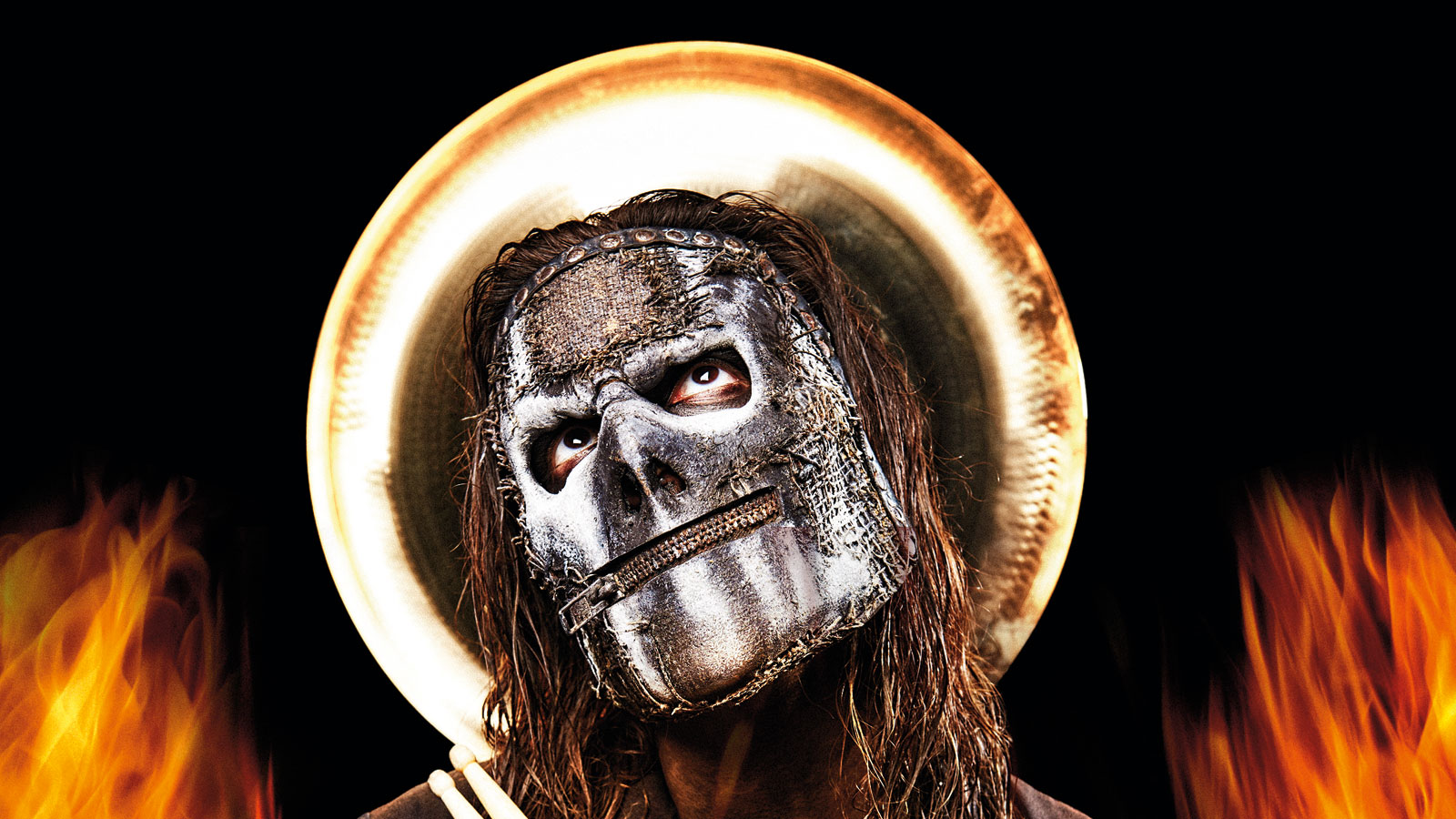
Introduction - growing up with Slipknot
New Jersey, 2001 – Nine variously horror-masked, axe-wielding mentalists and sinister percussive clowns are tearing up the stage on the holmdel, NJ leg of ozzfest, the annual touring metal show which this year also boasts Sabbath, Marilyn Manson and Papa Roach.
This, however, is Slipknot – on the verge of releasing second album iowa, and demonic drummer Joey Jordison is in full flight, blasting through crowd-pleasers like ‘The Heretic Anthem’ behind a blur of black-overalled nutters.
It’s new to many, a bewildering combination of bludgeoning metal aggression and frightening horror theatre. But one 10-year-old boy, watching wide-eyed with his drummer dad, has seen the future. Not just the future of metal, but his own.
A couple of weeks before, Slipknot had been invited to invade American homes via popular US chat show The Late Show With Conan O’Brien. Max Weinberg, of Bruce Springsteen’s E Street Band, and leader of Conan’s house band the Max Weinberg 7, returned home that night to enthuse about what he had witnessed up-close, to his family, including 10-year-old son Jay.
"My dad came home and was like, there’s this band you’re not going to believe... I’d never seen anything like it so I was hooked immediately."
“My dad came home and was like, there’s this band you’re not going to believe, we’ve got to check them out, they’re coming to town soon on tour, we gotta go!” recalls Jay Weinberg.“They invited us, so the whole family went to Ozzfest and they blew my mind. I’d never seen anything like it so I was hooked immediately.”
Witnessing them at Ozzfest kick-started a lifelong love of the band for young Jay, who would go and see the band every time they toured near his New Jersey home, and the band, thanks to an introduction via Max, would welcome Jay to come hang out.
“Because they toured so frequently it was like several times a year, so each time they’d see me I’d be a little taller, a little older, would have a cooler metal band T-shirt on, and they’d see I’m learning about music, I’m learning what I’m connecting with, which is this music that we all love.”
Young Jay grew as the band thrived and, playing along to the band’s punishing music, he learned to play drums in the shadow of his hero Joey Jordison. Raised, of course, on his dad’s musical legacy with Springsteen, but with a love of punk, hardcore and other aggressive styles, Jay made a name for himself in punk band Against Me!, before he found himself called upon, by personal request, to audition in 2013 for the Slipknot drum stool following the departure of founding member Joey Jordison.
"I followed him down the rabbit hole – I didn’t know at all what I’d just got myself into."
“When I got the call I was finishing up finals for my last semester at college,” recalls Jay, by now 20 years old, “and I got a text from Slipknot’s manager who coincidentally was the manager for Against Me.
"He said, ‘Could you make it out to LA in three days?’ And I was back in New Jersey at this time and I was like, ‘What for?’ And he said, ‘I can’t tell you, can you make it out here?’
"And I followed him down the rabbit hole – I didn’t know at all what I’d just got myself into. So I went out to LA, met the guys in the studio and it went from there.”
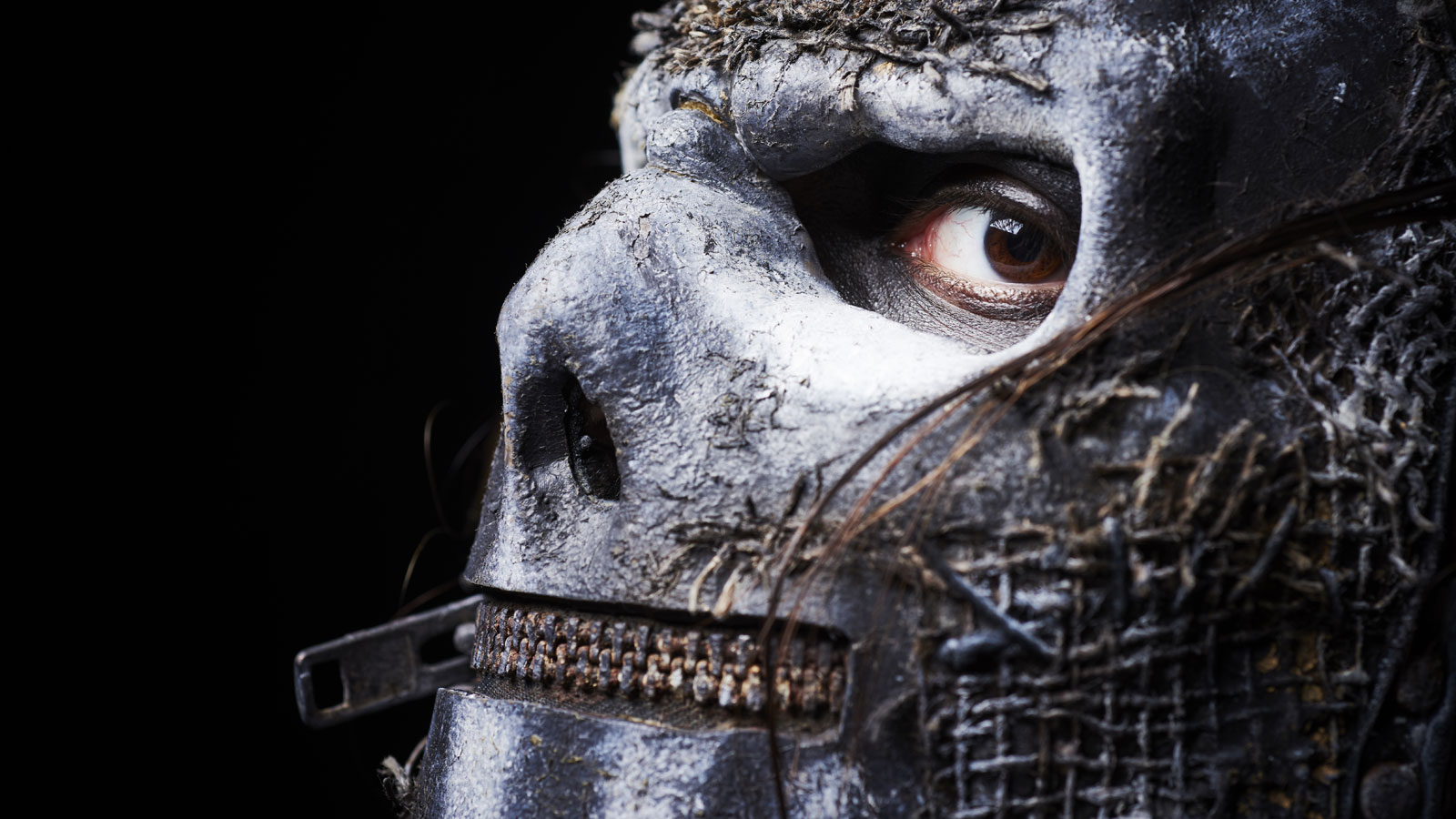
Joining up
So what happened at that first audition?
“It was a sombre occasion, there was a definite mood in the room of what the band was going through, moving forward without a brother that has been with them for 20 odd years. I wanted to treat the situation with a delicate, careful respect.
"Clown asked me, do you know any Slipknot songs? And I was like yeah."
"Being a lover of the band, an appreciater of the music and what the guys had brought to my life, they’d brought a lot of joy to my life, I wanted to kick the door in with the Slipknot attitude that they wanted but I wanted to be respectful of what they were going through because it was a really heavy thing.
“I had no idea, no one had any idea, of what the band were going through, it was a complete secret, so I was one of the first people to know that the band was moving forward without Joey Jordison.
"So once we got that out of the way, they were, ‘Hey, you’re family to us, you’ve been coming to see the band for the last 15 years, we know you love the band, we love you as a person, we’ve never seen you play drums and we’re curious.’
"Clown asked me, do you know any Slipknot songs? And I was like yeah, how about we start with these? And we started with ‘Before I Forget’ and ‘Duality’, those were the first songs we ever played together, and when we played those the whole vibe of the room started to change, and they were like, ‘Well, that sounded f**king awesome, do you know anything else?’
"And I was like yeah, let’s play ‘Disasterpiece’, and then we were just calling out, let’s do B-sides from the first record, let’s play ‘Get This’, and at that time it was clear that this was heading for a ‘holy s**t, this is lightning in a bottle, we’re really onto something’ kind of moment, and it just built and built.
"And that room that day was a very unique experience, going into it not knowing at all what was required of me, what I’m doing here and then at the end of the day I’ve just played 20 Slipknot songs with the majority of Slipknot, and that’s f**king crazy!
"And then we got to talking about, ‘Hey do you want to stay here more, and let’s work on more stuff, let’s work on some new Slipknot songs, Jim has material, we have riffs that we’re working out, do you want to jam on those? And so over the course of the next couple of days, literally the day after we had my audition, we began working on the new Slipknot record.”
Over the years you’d got to know the band pretty well, that must have made it more comfortable?
“I was going to shows regularly between 2001 and 2012, and 2012 was the last time I’d seen the guys before I auditioned. I spoke briefly with a couple of the guys [then], just hanging out – ‘Hey what’s up, awesome show!’ – and we’d evolved a friendship.
"I developed a friendship with Clown; over the years before he passed I would talk to Paul Gray about hockey, we’re both big ice hockey fans, so we’d dork out about hockey. I’d talk to Jim, talk to Corey Taylor, and hang out with the band after the show, and those moments really meant a lot to me because these were my heroes.
"Even when I was 13 or 14 years old, I could tell that these guys were just like me and we have this passion for the music and they were willing to just hang out after the show with me and my buddy, for an hour after they played, just bulls**t, just talk.
"I feel that that was a really important piece to have when you’re going into something like this, to have that commonality, that friendship but then to make that jump from the outside, being a friend, to going to the inside and playing with the band, that’s a big jump, so it was a big moment for us to start playing together.
"But from the first song I think we all knew that it was going to work out.”
Your previous bands were nothing like Slipknot, so presumably you knew what to do from playing along at home as a fan?
“When I was first learning to play drums, I started playing when I was 14 years old, my heroes were guys like Chris Adler, Brann Dailor and Joey.
"Listening to these guys and digesting what they were doing, and studying what they were doing, and going into the shed at my parents’ house with the drum kit and putting on headphones in the freezing cold in February in New Jersey, just trying to warm up playing fast, aggressive music!
"It went from me trying to play the live Ramones record to trying to play Master Of Puppets, and then once I got past that, playing material from Slipknot’s Iowa record, and Lamb Of God’s Ashes Of The Wake record, playing Mastodon’s Leviathan and stuff like that, just seeing if I could do it.
"And my audition with Slipknot, a lot of those songs I hadn’t played along to since I was 14, just figuring out how to play drums. So a lot of my playing that day was based on muscle memory from when I was 14. It was a really wild experience, to draw from, ‘Oh maybe this is what happens in this part,’ and my muscle memory came rushing back.”
"And after two days of doing that, Clown said to me, ‘If you want to play in Slipknot it’s yours'"
So at what point were you invited to join the band?
“So the day after I joined we began working on what would become The Gray Chapter, we booked some time at Travis Barker’s studio in the Valley in California, and that was where it was, ‘Oh, you can play the old stuff, that’s clear, how are you going to be when we need to come up with new Slipknot material?’
"And drums are such a huge part of Slipknot’s identity and sound, it’s got to draw from a lot of different things because Slipknot covers 20 different genres at any point of time, but it is a very specific feel.
"I think being an avid listener to the band for 15 years, that really helps me feel that, okay, I can tap into what Slipknot needs to make this record happen. So the sessions at Travis Barker’s studio were exactly that, can you tap into what we need?
"After two days of doing that, Clown said to me, ‘If you want to play in Slipknot it’s yours – work hard, show us that you want to do this... this is not going to be easy but we see the passion in your eyes, we see the love for this music in you, it’s yours if you want it.’
"That was mid December 2013, and I went home, had the holidays at home, and went back to LA. First I went to Des Moines and started hanging out with Clown, visited Paul Gray’s grave, which meant a lot to me, to start this journey by paying my respects to one of the founding pillars of this band, then we went right out to LA and didn’t leave for six or seven months!”
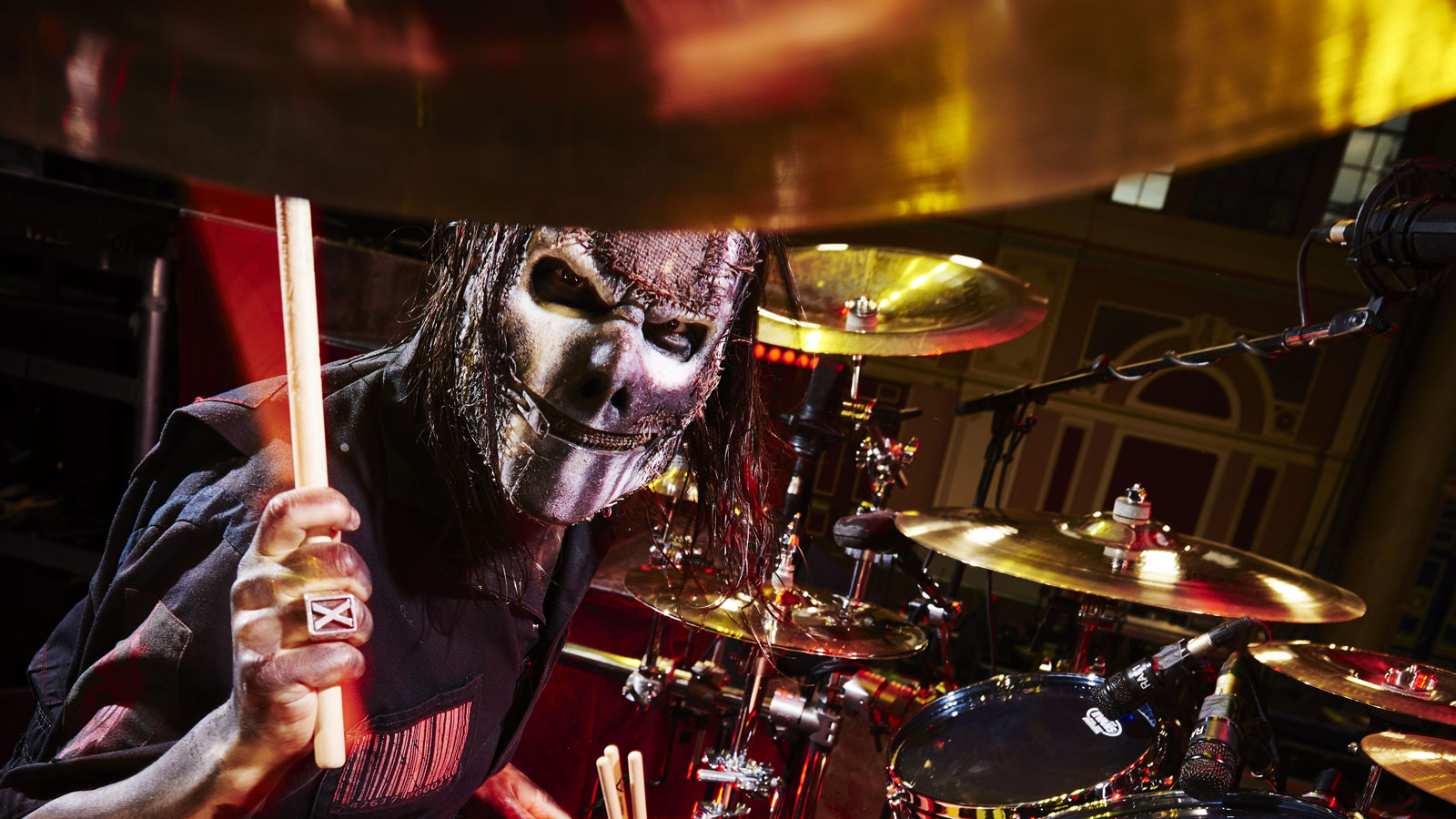
The Gray Chapter
Tell us about those sessions for what would become The Gray Chapter.
“I cannot overstate how intense making the record was. I believe for the first month and a half or two months it was just Jim Root, Clown and myself with our co-producer Greg Fidelman at a studio called Sound Factory in Hollywood, and we were there for between 12 or 13 hours a day, five or six days a week, for like two months, just working on pre-production, working on arrangements.
"Man, we did just take after take after take, searching for what Clown would call ‘the sex’ in the song."
"Jim had the bulk of the record pretty much written at that point, but we’re working out what riffs go where, how Corey’s going to approach his vocals, we’re covering 20 different songs all at one time and it feels chaotic.
"Like I’d be in there recording drums,‘Here’s a crazy out of the box idea, what do you guys think of this?’ And they were like, ‘Go crazy there!’ And we would piece together demos for what would become the songs and it was such a crazy, fun, stressful experience.
"Here are these guys that I have looked up to my whole life, artists and musicians, and here we are coming up with arrangements together, some songs we’re writing from scratch together, and it was really a total mindf**k for a couple of months, I’m pinching myself every day. Is this really happening?
“Then things get more serious, more guys from the band start coming out, and tracking the record was an athletic experience.
"Man, we did just take after take after take, searching for what Clown would call ‘the sex’ in the song. When you’re playing a song 10 times in a row, and I can’t even see straight because the song is depleting all my energy, then it’s, go for 10 more, go, go and go further and further and that’s when you get the desperation, the absolute craziness that this record needed.
"And I think that comes across on the record. It was an exhaustive, thorough process, the band pushing me, like Clown and Chris Fehn would be in the room with me, tracking. They’d just be going crazy, just because of the vibe, like we’re on a Slipknot stage.
"There was so much emotion because it is such a heavy record for the band, thematically, the first record the band’s ever done without Paul Gray, without Joey Jordison – that’s a huge responsibility for the band and for myself.
"Joey’s one of the greatest drummers we’ve ever had the privilege of witnessing."
"So it was like we were treading lightly on the weight that is in the room at all times, this ever-present vibe that’s there, but we’ve got to push on, we’ve got to make this record as great as it needs to be. And I think we accomplished that. It was a steep learning curve for me but I think we came up with something really great.”
How respectful did you feel you had to be to Joey’s legacy, and how much did you feel you were free to make it your own?
“Having a massive respect for the band’s music, having a massive respect for Joey Jordison as a person and as a player, I understood my role in needing to deliver what this band needs, and understanding what Joey brought to the table, and having this band’s legacy continue in the way that the Maggots, the fans of the band, respect, and the nine of us feeling proud of the music we’re creating.
"Of course the history of the band feeds into what I think of the band, but when it came time to come up with new material, new songs, I didn’t think about Joey Jordison one bit. And I feel it would be disrespectful to do that, and the band wanted me to be completely myself. Because why would I want to be Joey Jordison, why would I try to mimic what he’s done?
"Joey’s one of the greatest drummers we’ve ever had the privilege of witnessing. So as a fan of the band and someone who respects the people and the music, I didn’t want to come in and try to be a copycat.
"That’s not interesting to me, that’s not interesting to the band and it would be insulting to everyone involved, including the fans.”
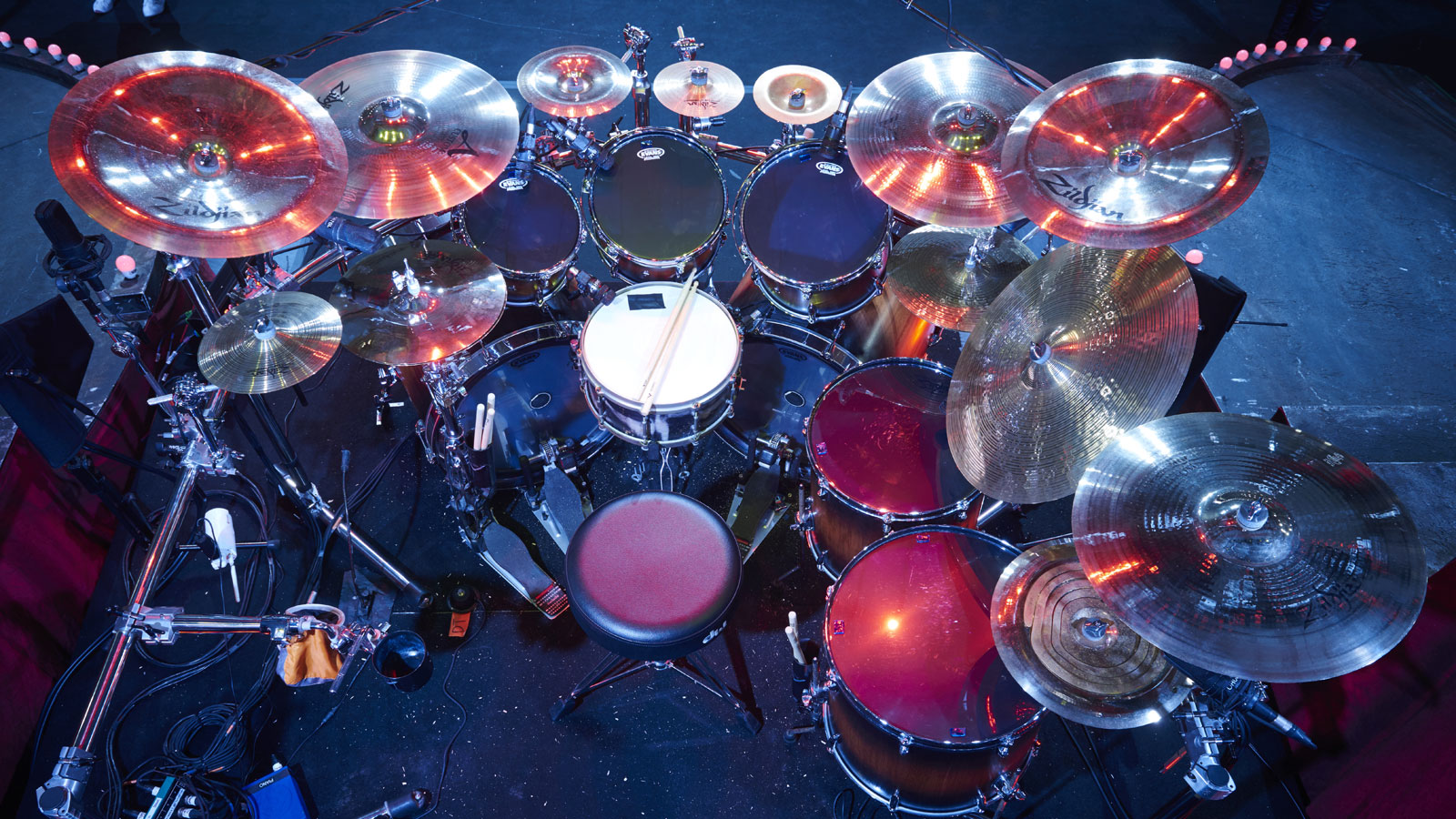
The kit - and the mask
For the first sessions, did your set-up reflect what Joey had played at all?
“I didn’t take anything like that into account when we started working on new Slipknot material. The vibe of the music we were making together was so strong, I knew right away what gear I’d need to come up with the parts I’d be creating and recording during these sessions.
"Two big-ass kick drums. Brass snares. Cymbals that cut through eight other layers of instruments and vocals. Booming toms. Definitely no triggers, or sound- replacement samples, any of that.
"My set-up is relatively utilitarian, in that it’s just the necessities for what I want to accomplish, musically. Nothing superfluous; that stuff just gets in the way.”
"I like taking things away and restricting what I have to work with to the bare essentials."
Have you had to make any amendments to your set up as you’ve settled in to the gig, have you added anything in to suit the shows?
“On the contrary, I’ve actually removed some things since we’ve started playing live.
"I would hardly ever hit a crash I had set up on my far left, so I got rid of it. I only played my gong drum a few times, so I got rid of it.
"I want to execute this music and the rhythms in my head with a relatively streamlined palette of sounds.
"I think part of the Slipknot mindset and philosophy is to make the job harder up there as opposed to easier; to just lose yourself within the power of the art and music.
"The masks, coveralls and pyro are a testament to that. So I like taking things away and restricting what I have to work with to the bare essentials. There’s still a f**k-ton of drums and cymbals, but it’s only what I need.”
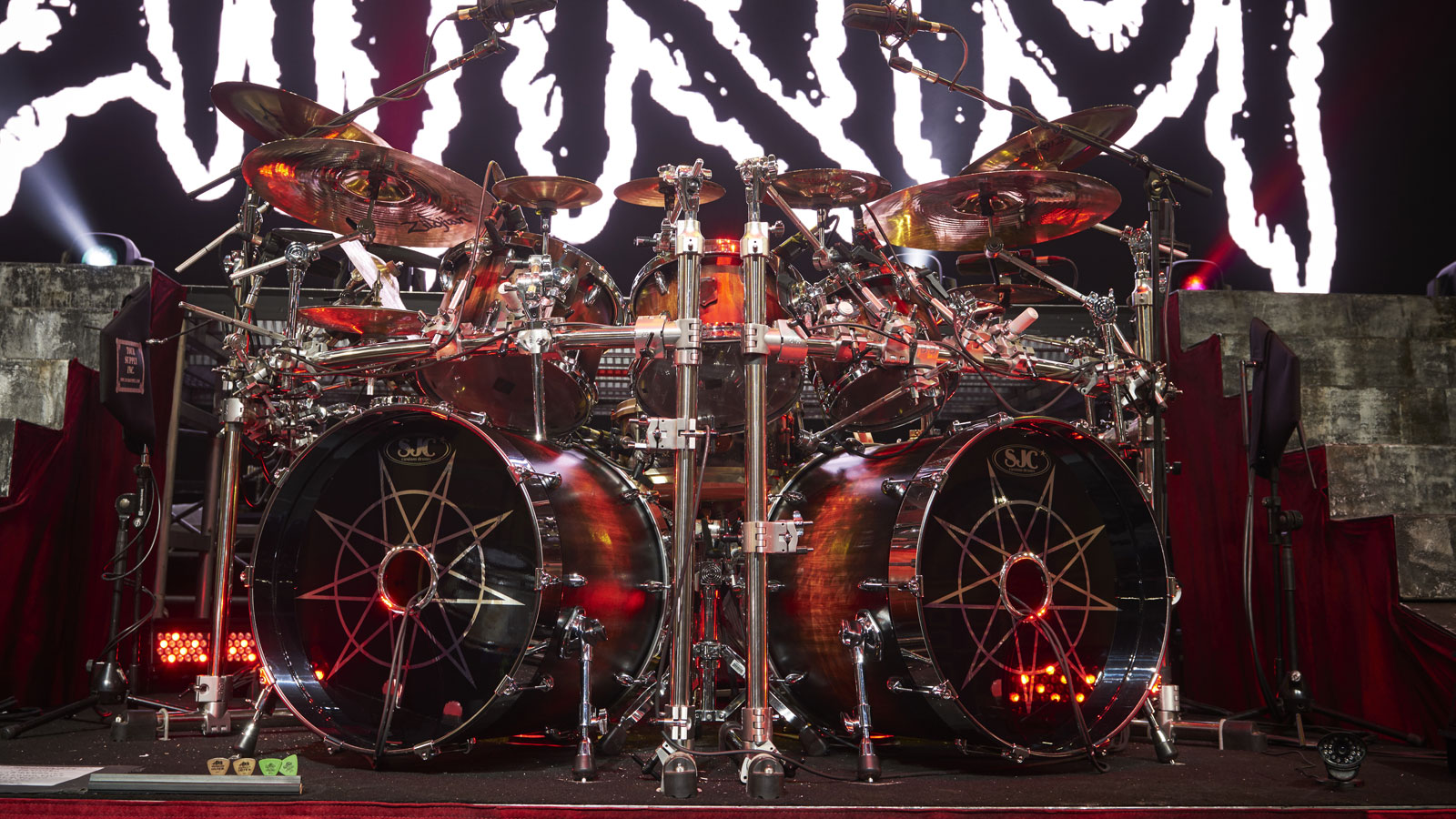
You use two bass drums with single pedals rather than single bass and a double pedal. why do you prefer that?
"... using triggers, f**k all that man, it’s all about the natural tone and what you can do – caveman style!"
“I like having two single pedals that go to two different kick drums because it mimics two different feet, my feet are separate appendages so I like them to sound like that, I’ve never felt comfortable with a slave pedal – two separate bass drums, two separate single pedals.
"All this competition of getting your kick drums to sound exactly the same, and sound replacement, using triggers, f**k all that man, it’s all about the natural tone and what you can do – caveman style! One drum, one thing, simple!”
How has the reaction of the Maggots (the band’s fans) been?
“I think it’s been good. Meeting kids everywhere, it’s really cool to me to share the experience of loving this band and I see how they love it and I think they see that we’re one and the same, the Maggots and me are one and the same.
"This band is the first band that convinced me of the power and magic of music, not even just heavy metal, but music in general – this was the band that convinced me that this is what my life should be dedicated to, music and art.
"And to see the fans’ passion for the music, I see myself in them; they see themselves in me and I just so happen to be the one that 10 years ago I was on the barricade screaming my lungs out, getting my ribs crushed against the barricade and now I’m the one that made it over the barricade onto the stage.
"I love the fans, I’m one of them.”
"A lot of people tell me, ‘It makes me wanna chase my dreams because dreams are within my reach – look at you, you did this, you made it onto the stage.’ And you can set your goals to whatever you want to accomplish – it’s very hard and you have to sacrifice a lot but with all that hard work and sacrifice comes great reward. And I view playing with Slipknot to be a great reward.
"So the only kind of feedback I get is when I meet people and I see the love in their eyes for this music, for the people in the band, and it makes me feel very included and it’s a very welcoming feeling. It’s a really cool bond I have with the fans.
"I love the fans, I’m one of them.”
How much input did you have into the mask?
“Clown came up with this kind of general Maggot mask for both Alex [Alessandro Venturella, bass] and me. And it’s cool because over the course of time I’ve painted mine, I’ve ripped the burlap off, trying to evolve.
"Truthfully it’s starting to fall apart! Just ’cos of all the sweat, all the nonsense, the spit, the vomit, the blood that goes into that thing. It’s just disgusting.
"My parents come to the show and I want them to smell it and they won’t! We’ve been on the road with each other now for over a year, it kind of got to the point where I’m like, I’m gonna let my personality through on this blank canvas of a mask.
"It’s very unexpressive, it’s very plain, it’s very stark in that way. So as I become more ingrained in the culture of Slipknot, starting to really connect with fans... originally we weren’t even going out to meet fans. We have meet and greets each day on tour and we weren’t even going out to do those originally because we were the secret guys.
"Now I’m doing them every day and I’m more than happy to do it because I love connecting with people that I share this bond of music with, so as I start to shed layers, these protective layers of whatever, they start to fall off and my personality is starting to show through more and more in my playing.
"That you and I are talking together is the perfect example of those layers shedding away, because a year ago we wouldn’t be talking together like this. So as time has gone on, art is a big part of my life so I’m starting to paint my mask and personalise it a bit more, have a bit more of me come through, and I feel that’s a natural progression, a natural evolution of this tour cycle, as the tour weighs on us, it weighs on everybody.
"It’s the best kind of work but it is hard work and so you start to really connect with who you are, and who you are in relation to this travelling circus you’re a part of, all these people around you. So yeah, that’s a crucial part of our live show, I’m going to introduce a little bit more of myself to it every now and then.”
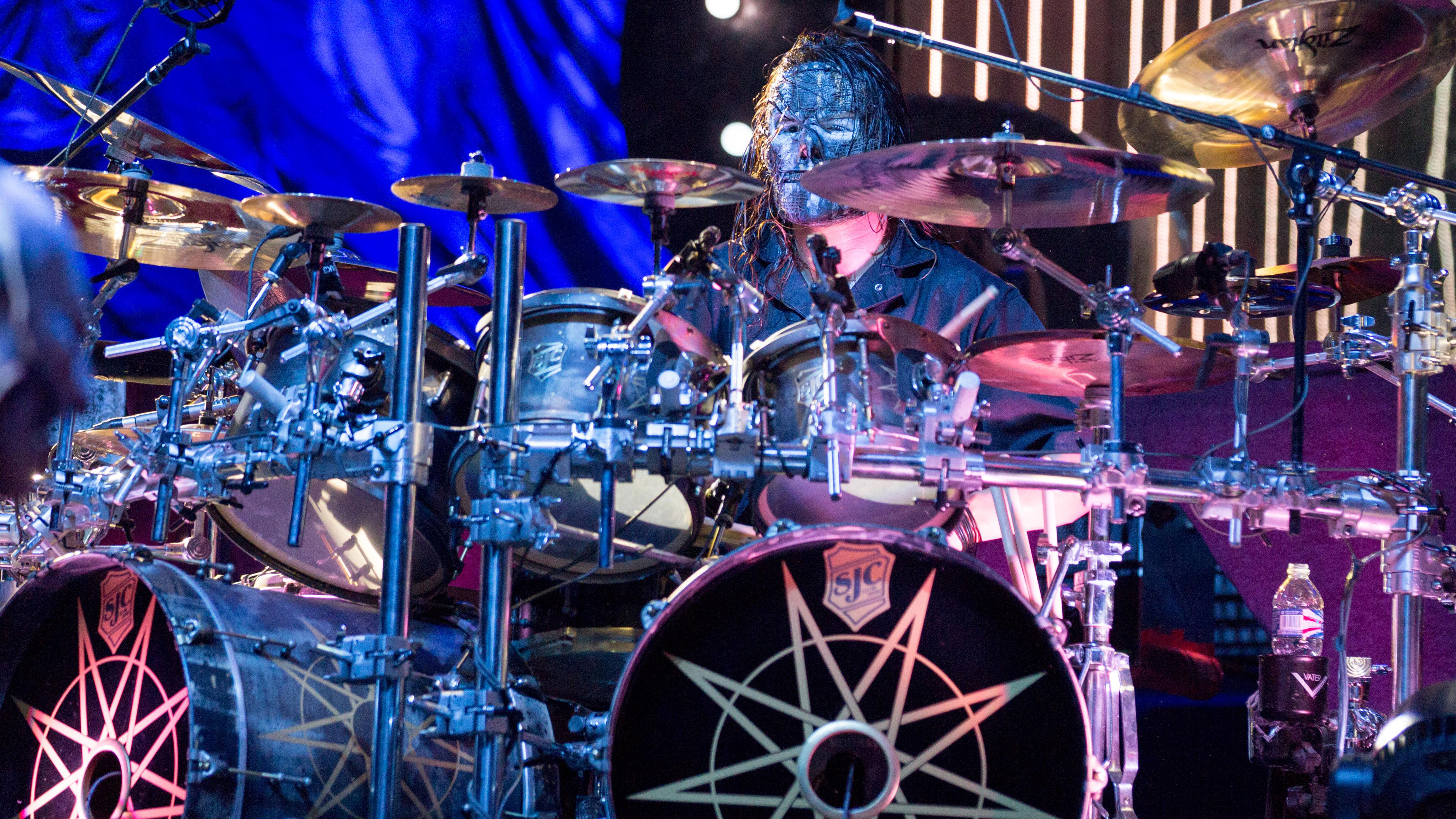
"Every night I want to be completely drained"
How hot does it get up there in the mask?
“F**king hot! Thankfully on this upcoming tour I’ve heard we’re getting rid of the pyro, whichat some points in our set it really pushes your limits physically as a human.
"You’ve got the coveralls, you’ve got the mask, you’ve got music that’s already challenging to play, you’ve got fire, you’ve got strobe lights – it’s complete human sensory overload!
"Which is partly I guess what this band is. I make sure that at the end of every show, at the last hit I want to make sure I couldn’t give another hit after that show!
"Every night I want to be completely drained. I like the athletic nature of drumming, more specifically drumming for Slipknot, it’s like a competition with myself. I like pushing myself and being like, ‘You can take more than that!’
"There are times I will leave myself and completely forget I’m playing a show."
"Our tour we did with Lamb Of God, we’re playing in late August in Las Vegas, which is already brutally hot in the desert, we’re the last band to play, we’ve been waiting around all day in a boiling hot parking lot so the asphalt has been baking in the sun, then you’ve got to get up and play with all this pyro and it’s so f**king insanely hot!
"There are times I will leave myself and completely forget I’m playing a show. It’s like driver’s amnesia, like you forget the drive home. All you know is you left work and you got home but you don’t know what happened between.
"During one of the shows Alex even passed out due to the extreme exhaustion and dehydration and we had to play a whole show without him. It’s super scary but it’s a real thing we have to be aware of.
"My whole day is focussed around that two hours I have to play. And I’m warming up backstage for two and a half hours before we hit the stage. Because I want to get up there already being warmed up, I want to be tasting blood before I even get out there, so I’m playing all day, I’m eating the best I can.
"I don’t drink alcohol, I don’t partake in any drug, all I do is play music and live the best life I can."
"I already lead a pretty healthy lifestyle, I don’t drink alcohol, I don’t partake in any drug, all I do is play music and live the best life I can. But man, even when you’re taking really good care of yourself, Slipknot’s show will destroy you!
"So it is hot, it hurts, but when you get to take that mask off and you say, ‘I just played a show at Wembley Arena tonight,’ that’s a special thing, it’s always worth it.”
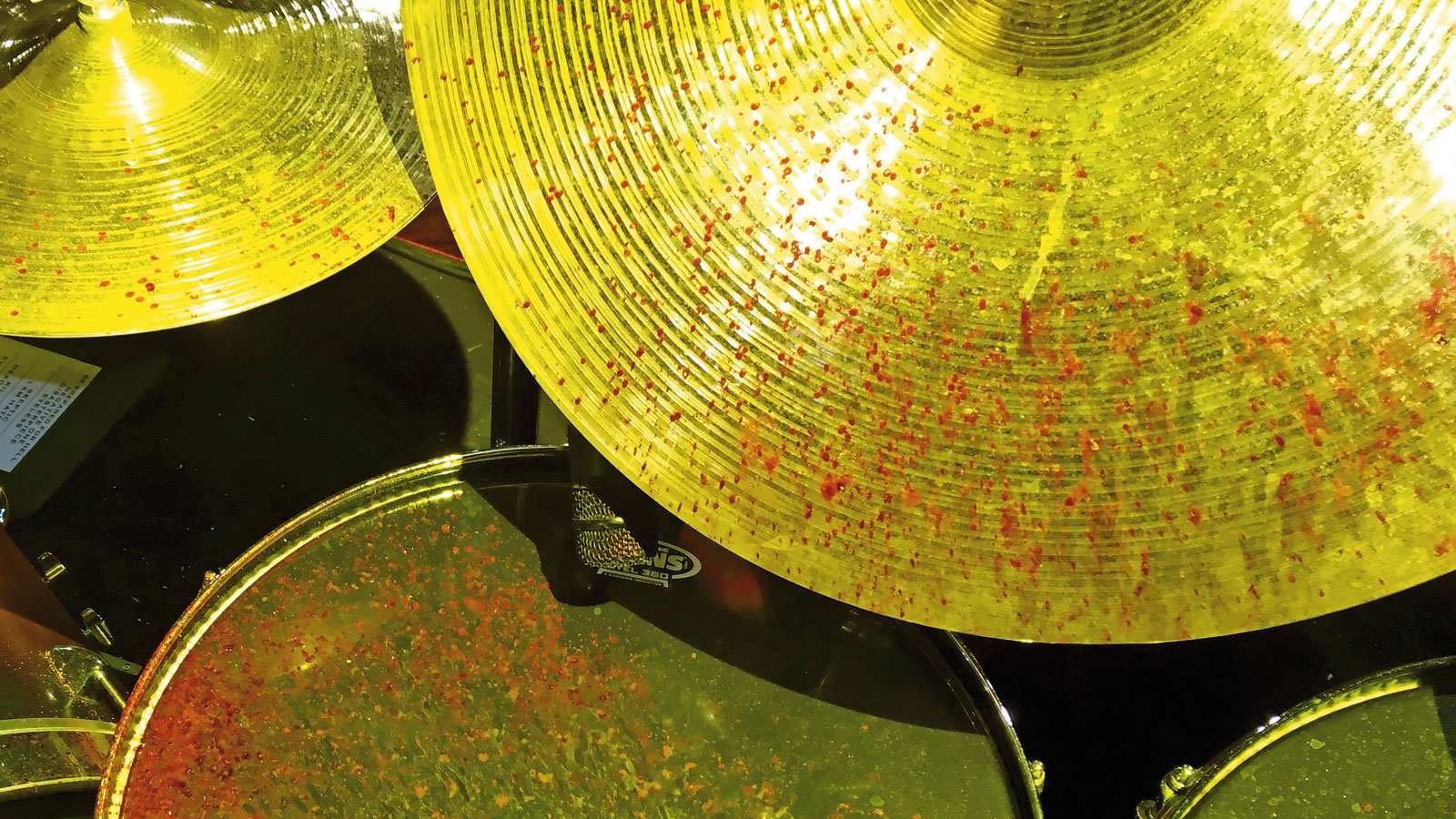
Note Jay's blood on the drums and cymbals...
How crazy can it get up there on stage?
“Very, in a bunch of different aspects. Set-list wise we like to spice it up a bit, this upcoming tour in particular we’re throwing the book out, we’re playing a lot of material we haven’t played together before, some songs Slipknot’s never played before ever. And then once we’re onstage playing the songs, you’ve got unpredictable characters out there.
"A guy like Clown, you don’t know what he’s gonna do. I don’t know what he’s gonna do. He might be totally vibed out in the mood of a song and losing himself in the song as we all are, sometimes he’s getting ready to throw a baseball bat and it’s going to come over and hit you!
"A guy like Clown, you don’t know what he’s gonna do. I don’t know what he’s gonna do."
"Chris Fehn will just come and steal a cymbal, now I’ve got to figure out how to play the chorus without having any crashes, and you’ve just got to deal with it. We’ve got a saying in Slipknot: you’re not getting out of it. You’ve just got to deal with it! We keep it fun and it’s very unpredictable.
"None of what we do is scripted. I don’t play to a click track, I don’t use triggers. There’s no samples, there’s no backing tracks. For a band of this size and what it does, it’s a total tried and true punk band.
"The attitude is very much what I grew up with, playing punk rock and hardcore, you just give it your all and f**k all that pre-packaged, pre-recorded and staged rock’n’roll, Slipknot is the most unstaged rock’n’roll, and I think we’re very proud of it.”
Playing with two percussionists in the band must be a lot of fun, how do you approach the parts that involve all three of you?
“There is one thing that Clown had expressed to me early on in my playing for the band. What I create with Slipknot, it’s my mission to make it impossible for him to fit into a song. To make it impossible for Clown and Chris, as the percussionists of the band, to fit. Because they will find a way.
"These are Clown’s words because he was teaching me about the philosophy of Slipknot with that percussive thing in mind, that the music has to stand on its own and he and Chris will find their way into anything I throw at them.
"Once I was like, ‘Hey, if I’m doing this on the drums you guys can be doing this percussive thing,’ and he said, ‘That’s not what we do here. What you do is what you do, and you don’t have me in mind, you don’t keep me in consideration for coming up with drum parts. I will find my way, Chris will find his way, and we’ll all come together because we all need to be confident in ourselves to do what we do.’”
You must be able to choose any company to endorse, but you’ve stuck with custom drum company SJC?
"As long as they’re putting out drums I’m going to play SJC drums."
“I have a bunch of different kits from SJC – the Ciprari brothers, I love them, they’ve developed a lot of great stuff for me. Those guys were supportive of me when I was doing nothing, they are supportive of me in whatever I do.
"I like working with people I respect and are friends of mine, that’s always been important to me, so as long as they’re putting out drums I’m going to play SJC drums.
"I just kind of come up with a crazy idea like, ‘Hey I want a drumset that’s all stripped of any finish but spray-paint the Slipknot logo onit, and I want a 50-ply snare drum with two vents and we’ll mic the vents because I want it to be crazy stupid loud, and they’re like, ‘Got it,’ and they’ll have it to me the next morning.
"I don’t know any other company that would do that. I have an idea for a snare drum and it’s in my hands the next morning. Crazy. SJC goes above and beyond.
"My main kits with Slipknot, I have one maple kit and one bubinga kit, for our upcoming tour that will be the bubinga kit. I like having different woods. As much as I love the drums I play, as soon as I’m bored and in a comfort zone I like to switch it up, I like to play a different wood, play a different sized drum, maybe take drums away, add stuff, I just like keeping it fresh.
"So, I’ve got to have that quick response, sharp sound, like totally punch you in the face and demolish you and rip your ear drums out. That’s just what I want to do with my drums!”
How much advice has your dad Max given you about your drumming?
"He [Jay's dad] and I are very, very different drummers, but I believe he passed down his relentless work ethic to me."
“The relationship I have with my dad is incredibly special, and something I wouldn’t trade for the world. But when I think about it, we don’t speak about actual drumming much of the time.
"He’s given me invaluable advice from his 55-plus years of playing, in terms of maintaining my health and not damaging my body from my playing – something I do plenty of with Slipknot.
"We’re more keen on talking about our relationship to music in general, to the bands we play with, and to the people we surround ourselves with, as we lead similar creative paths in life.
"His best advice was just through his encouragement for me to give every ounce of myself to my passion. To play with every musician I could find, in any style of music.
"I’ve never taken a lesson in my life."
"He and I are very, very different drummers, but I believe he passed down his relentless work ethic to me, and that’s one of the common threads in our unique bond.”
Did you take lessons with him, or any notable teachers?
“He just told me to work my ass off! Truthfully, that was the extent of my musical training. I’ve never taken a lesson in my life.
"However, I’m constantly learning from those around me, and I always ask questions of the drummers with whom I’m on tour. But I’d prefer that my playing reflect my burning passion for the instrument and the music we create, as opposed to a formulaic, sterile way of approaching the art.
"There’s no right or wrong way to approaching the craft, and that’s one of the things I love about it.”
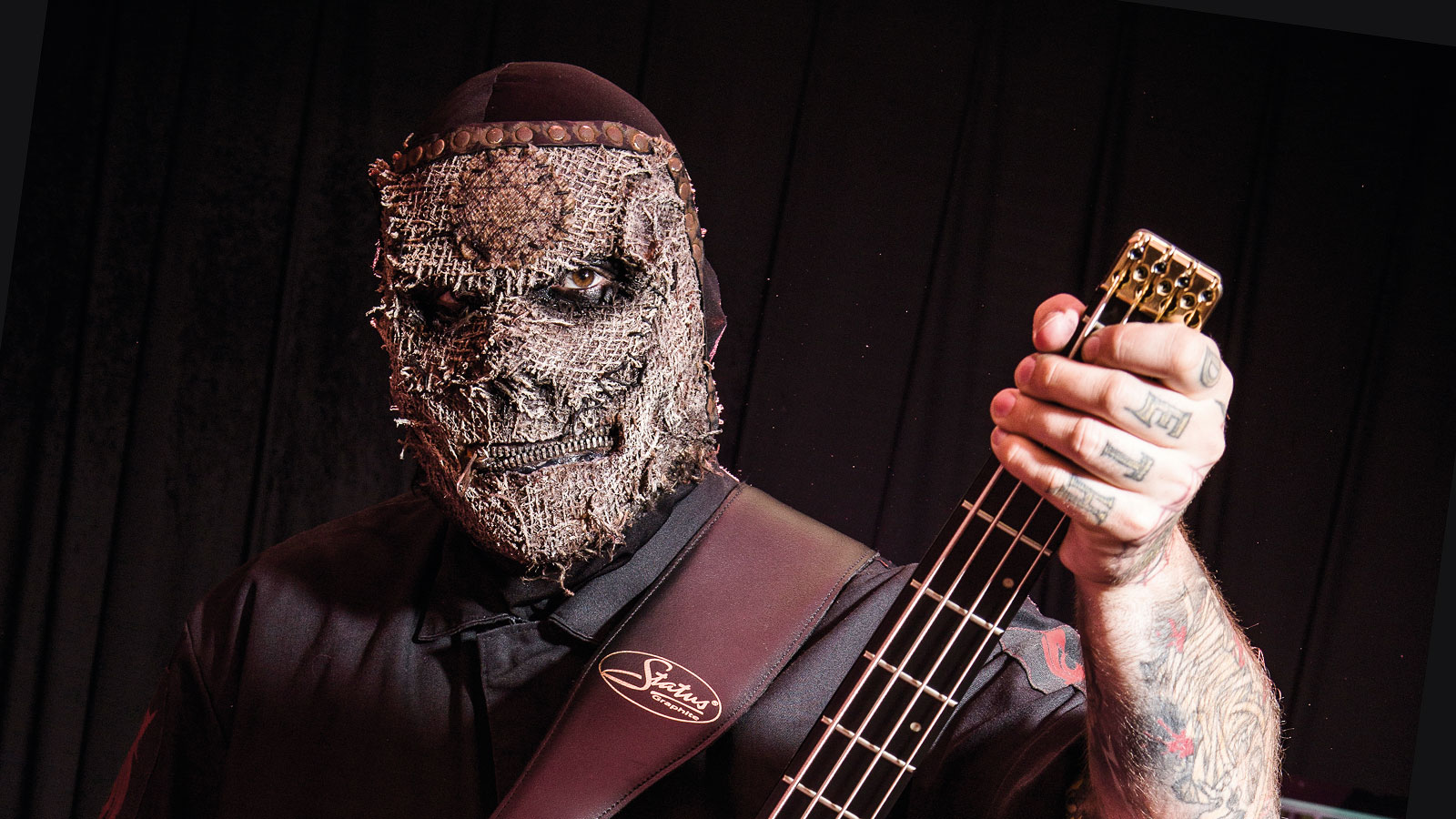
Bonus interview - Bassist Alessandro 'V-Man' Venturella on Jay
Slipknot bassist V-Man on the band’s new rhythm section...
What do you like about playing with Jay?
“It’s the way he sits with the band. Being a Slipknot fan and growing up listening to Slipknot, it’s the ramping up and the way the band works. If they were to be continually like ametronome it wouldn’t sound like Slipknot.
"With Jay he’s managed to do what Joey was doing, tight and solid, but it’s the way we go in and out of stuff. I don’t have to look at him on stage to see where he’s going next, it’s very easy to read him.”
How much did you jam as a duo at the start to get the rhythm section locked in?
“We were at Jim [Root, Slipknot guitarist]’s house for a couple of weeks. Jim set up a ghetto drum kit. Half a Gretsch, the stool was falling apart. When I was working with Fightstar I was looking after Omar [Abidi]’s drums so I understood about drums and tuning. I ended up fixing all his stuff and setting up his kit and we jammed.”
How has your musical relationship evolved?
“We changed parts, where I felt maybe I can lock in with a kick pattern better. There’s bits we’ve moved around for self-gratification, not changing the song, but patterns where it gives it more punch.”
Who are your favourite rhythm sections?
“Sikth. I grew up with them and I play with them in Krokodil. James [Leach, bass] and Dan [Foord, drums] are the metronomes. They’re fun to watch. The tightest rhythm section would be Pantera, Rex and Vinnie. Watching them play the Monsters Of Rock in Russia, it’s literally like the record. You can’t get tighter than those two.”